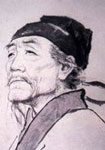“得醉即為家”的意思及全詩出處和翻譯賞析
“得醉即為家”全詩
異方同宴賞,何處是京華。
亭景臨山水,村煙對浦沙。
狂歌過于勝,得醉即為家。
分類:
作者簡介(杜甫)

杜甫(712-770),字子美,自號少陵野老,世稱“杜工部”、“杜少陵”等,漢族,河南府鞏縣(今河南省鞏義市)人,唐代偉大的現實主義詩人,杜甫被世人尊為“詩圣”,其詩被稱為“詩史”。杜甫與李白合稱“李杜”,為了跟另外兩位詩人李商隱與杜牧即“小李杜”區別開來,杜甫與李白又合稱“大李杜”。他憂國憂民,人格高尚,他的約1400余首詩被保留了下來,詩藝精湛,在中國古典詩歌中備受推崇,影響深遠。759-766年間曾居成都,后世有杜甫草堂紀念。
《陪王侍御宴通泉東山野亭》杜甫 翻譯、賞析和詩意
《陪王侍御宴通泉東山野亭》是唐代大詩人杜甫創作的一首詩。詩中描述了杜甫和王侍御一同在通泉東山野亭宴會的場景,表達了對生活的豪邁和自在的追求。
詩中,江水東流,象征著時光的流轉,人生的不可逆轉,作者以此表達了對時光流逝的感慨。清樽日復斜,可能指的是觥籌交錯,宴會氛圍濃烈,樽酒不斷斜倚,喻示了宴會的熱鬧和酒的豐盈。
異方同宴賞,何處是京華,這兩句意味著杜甫和王侍御一同游玩在陌生的地方,這里是他們暫時的天下,享受著宴會的歡樂。亭景臨山水,村煙對浦沙,描述了野亭的景色,山水、村煙和浦沙相映成趣,給人一種清幽、恬靜的感覺。
狂歌過于勝,得醉即為家,表達了杜甫樂觀豪邁的情緒。他以狂歌樂飲的方式過過癮,對于他來說,只要醉倒了,哪里都是家。
整首詩流暢自然,情感真摯,描繪了詩人與王侍御在野外小亭宴會的情景,表達了對時光流逝的感慨和對自由快樂的追求。詩中的景色描繪和情感表達具有鮮明的視覺和感情效果,給人一種恣意而豪邁的詩意。
中文譯文:
江水東流去,清酌日復斜。
異方同宴賞,何處是京華。
亭景臨山水,村煙對浦沙。
狂歌過于勝,得醉即為家。
Poem Translation:
The river water flows eastward, as the clear winecups lean and slant.
In a strange land, we feast and enjoy together, where is the bustling capital?
The pavilion's scenery overlooks the mountains and waters, village smoke faces the river's sandbar.
Singing wildly, surpassing all, when one is drunk, that is home.
Poetic Meaning and Appreciation:
《陪王侍御宴通泉東山野亭》is a poem written by Du Fu, a great poet of the Tang Dynasty. It describes the scene of Du Fu and the court official Wang having a banquet together at the wild pavilion of Tongquan Dongshan. The poem expresses the pursuit of a carefree and unrestrained life.
In the poem, the flowing river symbolizes the passage of time and the irreversibility of life. The leaning winecups imply a lively feast, with the wine constantly pouring, reflecting the festive atmosphere.
The lines "In a strange land, we feast and enjoy together, where is the bustling capital?" suggest that Du Fu and Wang are temporarily enjoying themselves in an unfamiliar place. This place is their temporary world, where they indulge in the joy of the banquet.
The description of the pavilion's scenery, the mountains and waters, the village smoke, and the river's sandbar create a peaceful and serene feeling.
The lines "Singing wildly, surpassing all, when one is drunk, that is home" express Du Fu's optimistic and hearty emotions. He revels in singing and drinking, and as long as he is drunk, anywhere can be considered home.
The entire poem is smooth and natural, with sincere emotions. It depicts the scene of the poet and the court official enjoying a banquet in a small pavilion in the wilderness, expressing their feelings about the passage of time and their pursuit of freedom and happiness. The vivid description of the scenery and the emotional expression create a strong visual and emotional effect, giving a sense of unrestrained and hearty poetic meaning.
“得醉即為家”全詩拼音讀音對照參考
péi wáng shì yù yàn tōng quán dōng shān yě tíng
陪王侍御宴通泉東山野亭
jiāng shuǐ dōng liú qù, qīng zūn rì fù xié.
江水東流去,清樽日復斜。
yì fāng tóng yàn shǎng, hé chǔ shì jīng huá.
異方同宴賞,何處是京華。
tíng jǐng lín shān shuǐ, cūn yān duì pǔ shā.
亭景臨山水,村煙對浦沙。
kuáng gē guò yú shèng, dé zuì jí wéi jiā.
狂歌過于勝,得醉即為家。
“得醉即為家”平仄韻腳
平仄:平仄平平平
韻腳:(平韻) 下平六麻 * 平仄拼音來自網絡,僅供參考;詩句韻腳有多個的時候,對比全詩即可判斷。